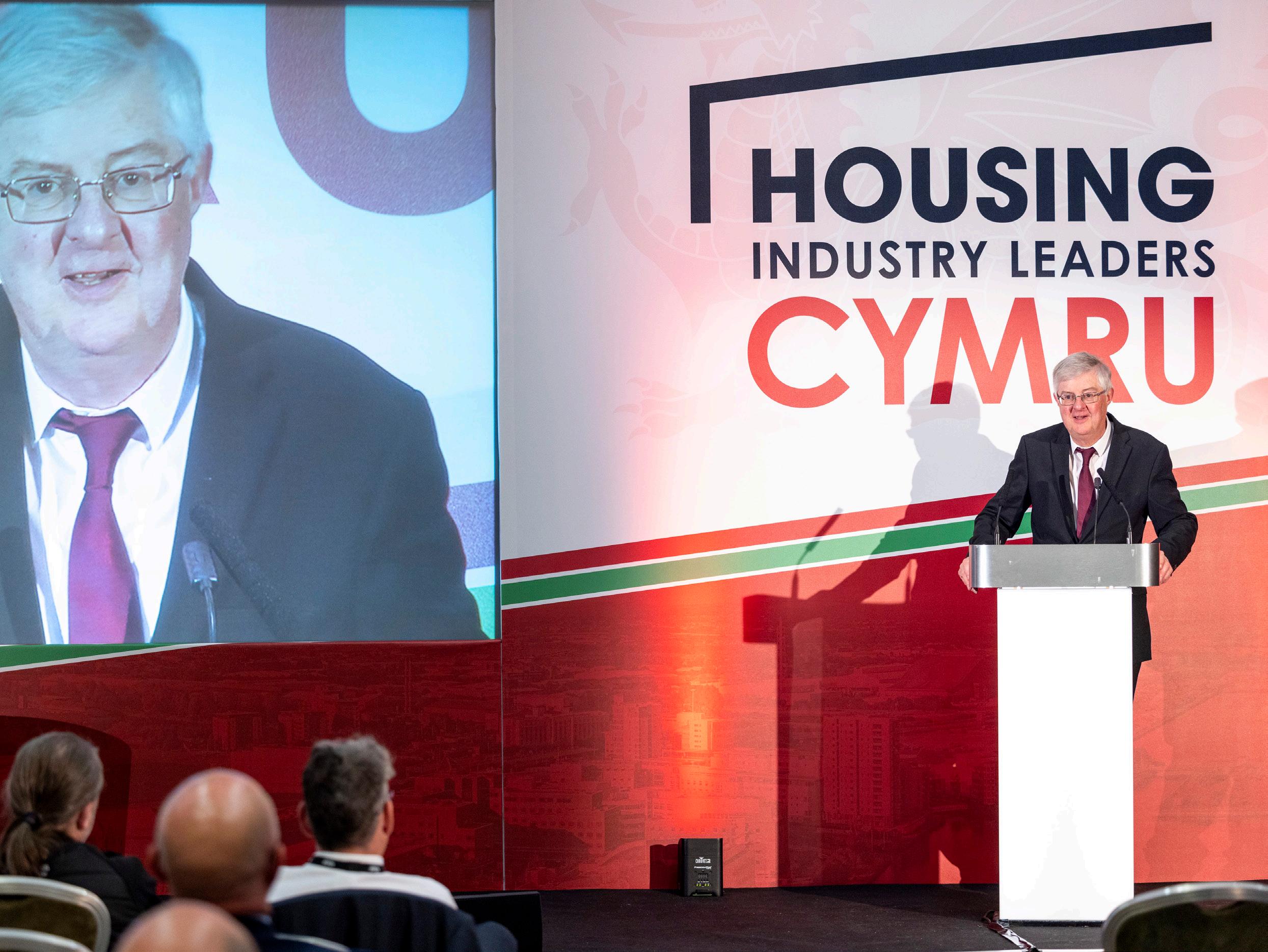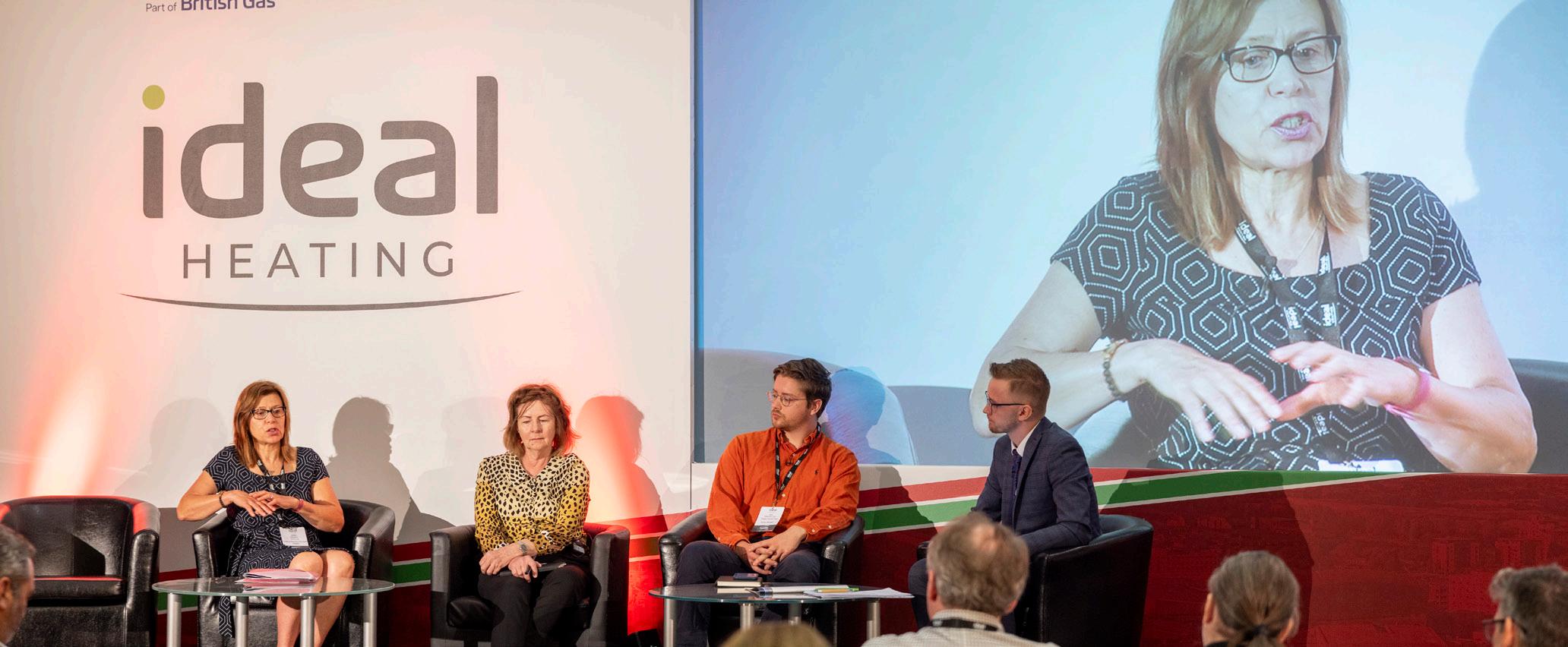
5 minute read
Exploring the Intricate Steps Towards Net Zero Housing
by Chelsea Bailey
The clock is ticking for the housing sector to not only meet net zero carbon by 2050 but also to achieve EPC C across all homes by 2030. How can we drive the housing sector to net zero?
Advertisement
Currently, housing accounts for around a fifth of all UK GHG emissions. A considerable amount is from the oil and gas used for heating and hot water, with around 10% of these emissions coming from the housing sector.
Housing associations own and manage around 2.7 million homes across England. To achieve the EPC C rating and to meet zero carbon, significant bottlenecks which are limiting the ability of housing associations to retrofit at scale and quickly, must be overcome.
The housing sector and the finance sector must come together
At the Housing Industry Leaders Cymru Conference, a panel discussed the drive to net zero and what it means for decarbonising the housing sector.
On the panel was Jack Wilkinson-Dix, Policy Manager at Energy Saving Trust, Lynne Sullivan OBE from the Net Zero Performance Hub, and Jackie Leonard, Head of Projects (Wales) at CHIC.
The current efficiency of the UK’s housing stock means a huge retrofit operation will be required to meet net zero.
The National Retrofit Hub is addressing the complex challenges of retrofit, by engaging with and bringing together stakeholders across the UK to support local retrofit delivery.
Lynne explained that the objective of the Hub is to bring initiatives together: “We wanted to create a knowledge hub which streamlines processes and feeds these into initiatives from the finance sector as well as all the initiatives that exist on skills and training.”
Working with the finance sector is crucial to see the housing sector improve its current housing stock.
In recent years, the financial pressures for social landlords have increased as they face the demands of building new homes, retrofitting existing stock to improve energy efficiency, and tackling health and safety issues.
On this, Jackie highlighted that to see the finance sector work with the housing sector, a clear roadmap must be in place: “Financers need to at least see the next 3 to 5 years, they need to know what is coming through, what type of work that is, and what skills are needed to deliver that work.”
Continuing, Jackie stated this collaboration is needed to ensure that skills are a priority: “We need to have a long debate that links to the developing of the skills that are needed the most. This links with some of the other conversations that we're having about how we build up those skills.”
The private sector must increase the energy efficiency of its housing stock
Lynne added that the National Retrofit Hub lets sectors see the future vision, incentivising them to explore net zero technologies.
She said: “Through the Hub, we can get the knowledge out there and we can really finetune the processes and generate confidence in the market. This is what is needed to generate and leverage more finance, private finance as well as public finance.”
Incentivising the private housing sector is a huge challenge. According to Citizen’s Advice, 2 in 5 renters say their homes retain heat badly and renters are 2 times more likely to say their homes are very expensive to heat than homeowners.
Things could be changing for the better as Parliament is currently debating the Energy Bill which could increase minimum energy efficiency standards for renters and help to deliver warmer and greener homes that are cheaper to run.
Jack revealed that the recent findings by Citizen’s Advice show that the private sector wants to implement sustainable housing.

He said: “The private sector was always going to be a challenge, especially around the private rented sector. This is where we need to think about different incentives. There was a recent Citizen’s Advice which revealed that a majority of members do feel that it’s their responsibility to increase the energy efficiency of their housing stock. We need to work out how we can enable that to happen.”
Resident engagement will boost the adoption of greener housing
While the housing crisis means that the focus needs to be on affordability, energy efficiency and funding, what must become clear is that the housing sector needs to address the challenges and importance of resident choice in delivering these.
On how it is pivotal to recognise resident choice, Jackie shared that it begins with engaging with residents at the beginning of the process: “Residents should be in some shape or form involved in the planning and the conversations that social landlords are having when they are looking at a particular area that they want to be doing works in.”
Continuing, Jackie explained that is about utilising the relationships that already exist: “In many cases, engaging with residents is already taking place. There are already those channels, it is just about how to make the most use of those channels. Perhaps, that is having conversations about understanding the works taking place, why they are needed, and what difference they will make.”
Lynne confirmed that this communication with residents is one of the things that will help us to see more sustainable housing: “It is important for smaller communities to have the best communication about the journey they need to go on. It is all about having the understanding, it is about the part each of us plays in the big picture of climate change.”
Residents will play an important role in the delivery and adoption of greener housing, and their engagement must be part of the delivery strategy. Communication and shared learning are needed to set out expectations and a more developed supply chain.

The UK needs to implement sustainable technologies today to see the benefits
As well as resident engagement, another way in which the housing sector can make the transition to net zero is by adopting changes now, rather than later.
Jack revealed that people are committed to decarbonisation but to go forward with decarbonisation plans, they need to know how they are going to benefit from it.

He said: “People want to feel that they have a stake in decarbonisation, and we’ve seen that those who adopt technology earlier on or at the start of the peak are the ones who tend to have the benefits. We are talking about flexibility, decarbonisation, electric vehicles, and the way that they will interact with each other. There are powerful benefits to adopting those.”
The First Minister of Wales, Rt Hon Mark Drakeford MS delivered a keynote speech at Housing Industry Leaders Cymru and highlighted what the Welsh Government is doing to tackle climate change, with housing being a major player.
He explained that to make sure that we don’t get left behind, it is essential that housing is a key priority for everyone.
The First Minister expressed: “If we are to work together towards net zero then that means taking housing as a really serious contributor, both to the solution and the right to the ongoing problem that we face.”

To ensure this, the First Minister stated that the Welsh Government will be exploring how to be more energy-efficient: “We have to cut the carbon cost of constructing new homes and even more considering we have to take radical action to make existing properties more energy-efficient and to play a part in the pathway to net zero.”
Reaching net zero in the housing sector is crucial to tackling climate change, promoting sustainable development, enhancing the well-being of residents, and ensuring a more resilient future for communities.









